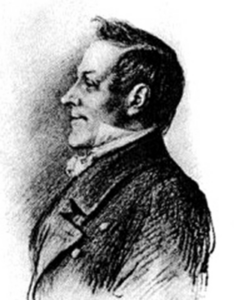Heliopolis II / In the high mountains
(Poet's title: Heliopolis II / Im Hochgebirge)
Set by Schubert:
D 754
[April 1822]
Fels auf Felsen hingewälzet,
Fester Grund und treuer Halt:
Wasserfälle, Windesschauer,
Unbegriffene Gewalt.
Einsam auf Gebirges Zinne,
Kloster- wie auch Burgruine,
Grab sie der Erinnrung ein;
Denn der Dichter lebt vom Sein.
Atme du den heil’gen Äther,
Schling die Arme um die Welt,
Nur dem Würdigen, dem Großen,
Bleibe mutig zugesellt.
Lass die Leidenschaften sausen
Im metallenen Akkord,
Wenn die starken Stürme brausen,
Findest du das rechte Wort.
Cliff piled upon cliffs,
Solid ground and trustworthy support;
Waterfalls, gusts of wind,
Unimaginable strength –
Solitary on the mountain peaks
Are the ruins of a monastery or perhaps a castle:
Etch them into your memory!
For the poet lives on existence.
Breathe in the sacred ether,
Throw your arms around the world;
Only those who are worthy, those who are great,
Courageously keep only those as your companions.
Let ardour roar
In metallic harmony;
When the strong storms rage,
You will find the correct word.
All translations into English that appear on this website, unless otherwise stated, are by Malcolm Wren. You are free to use them on condition that you acknowledge Malcolm Wren as the translator and schubertsong.uk as the source. Unless otherwise stated, the comments and essays that appear after the texts and translations are by Malcolm Wren and are © Copyright.
☙
Themes and images in this text:
Arms and embracing Being solitary, alone and lonely The ancient world Breath and breathing Castles and towers Courage Ether Harmony Poetry Lost and found Mountains and cliffs Nuns, monks and monasteries Rivers – waterfalls, rapids and whirlpools Storms Wind
Is there really a secure foothold? Will the poet really find the right word? This is one of those texts in which the writer seems to be making assertions and promises in order to overcome his unspoken doubts and uncertainties. He has fused the imagery of climbing high in the mountains with the struggle of the poet to express lofty thoughts, but so many of the ideas appear to be contradictory or confusing, to say the least, that it is difficult for the reader to share the writer’s optimism.
How can rocks piled upon rocks offer trustworthy support? Yes, the mountains are high and solid, but the cliffs feel precipitous and the pile of rocks is likely to totter. If we are high in the mountains, do waterfalls and gusts of wind really instil a sense of unimaginable strength? Aren’t we more likely to imagine potential disaster? The poet eventually encounters ruins on the high peaks, but he is unsure whether they are the remains of a castle (suggesting control over others) or a monastery (perhaps a symbol of control over oneself). Despite this uncertainty he tells himself that he needs to etch the scene in his memory, exploiting the ambiguity of the verb ‘graben’ (literally ‘to dig’), which could refer to engraving an image or to burying something (‘eine Grabe’ is a grave). Is the sight of the ruins an image to be kept perpetually before us as inspiration or something to be buried deep to stop us thinking about it?
Why do we need to do this etching or burying, this remembering or forgetting? ‘Denn der Dichter lebt vom Sein’: Because the poet lives on existence / being / essence / what there is (the infinitive verb ‘Sein’, to be, can operate as a noun[1]). This bald assertion begs more questions than it answers, though. What is life and living if there is no ‘being’? Why is the poet any different to anyone else in depending so fully on ‘being’? How is the memory of a particular place (or the process of arriving at that place) related to our ‘being’?
The word ‘Sein’ comes at the half-way point of the text, when the poet has reached the summit. From this vantage point he can embrace the whole world. However, he then proceeds to limit the number of those who should be embraced, restricting them to the worthy and the great (so, not the whole world!). He is aware of the need to retain (and proclaim) the ardour that has led him to the top of the mountain. He prepares himself to welcome the storms that are about to come. It is the striving, the climbing, the storms (rather than the secure ground underfoot) that will allow the poet to find the right words.
[1] There is a good summary of the history of the concept of ‘Sein’ in the New World Encyclopedia: https://www.newworldencyclopedia.org/entry/Being
☙
Original Spelling Heliopolis II Fels auf Felsen hingewälzet, Fester Grund und treuer Halt; Wasserfälle, Windesschauer, Unbegriffene Gewalt - Einsam auf Gebirges Zinne Kloster- wie auch Burg-Ruine: Grab' sie der Erinn'rung ein! Denn der Dichter lebt vom Seyn. Athme du den heil'gen Aether, Schling' die Arme um die Welt; Nur dem Würdigen, dem Großen Bleibe muthig zugesellt. Laß die Leidenschaften sausen Im metallenen Accord; Wenn die starken Stürme brausen, Findest du das rechte Wort.
Confirmed by Peter Rastl with Gedichte von Johann Mayrhofer. Wien. Bey Friedrich Volke. 1824, page 178; and with Gedichte von Johann Mayrhofer. Neue Sammlung. Aus dessen Nachlasse mit Biographie und Vorwort herausgegeben von Ernst Freih. v. Feuchtersleben. Wien, 1843. Verlag von Ignaz Klang, Buchhändler, page 44.
Note by Peter Rastl: Schubert received Mayrhofer’s texts in handwriting; the manuscripts of his cycle Heliopolis, dedicated to Franz von Schober, are preserved in the Vienna City Library. The printed edition of Mayrhofer’s poems appeared much later and presents the texts in a revised version. This poem (originally no. 12 of the cycle) is not part of the cycle in the printed edition of 1843. Here it is no. 2 of the cycle An Franz.
To see an early edition of the text, go to page 178 [192 von 212] here: http://digital.onb.ac.at/OnbViewer/viewer.faces?doc=ABO_%2BZ177450902


